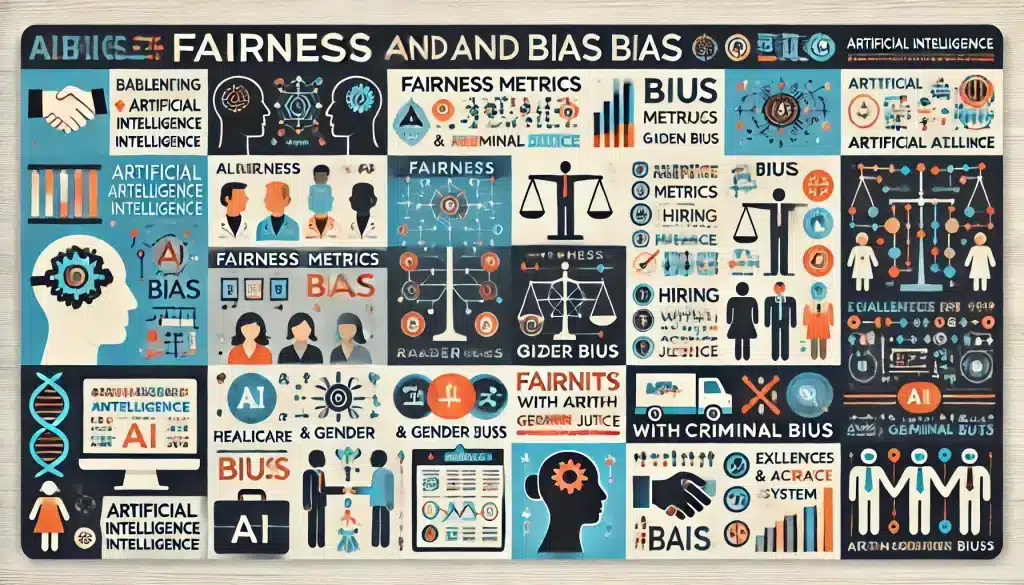As artificial intelligence (AI) continues to weave itself into the fabric of our daily lives, the concepts of fairness and bias in Artificial Intelligence systems have come to the forefront of discussions. From finance to healthcare, the stakes are high as we rely more on algorithms to make critical decisions. This piece will dive into the complexity of fairness and bias in artificial intelligence, providing a clear understanding while addressing crucial points such as why fairness in AI systems is crucial and how we can work towards achieving it.
What Is Fairness in AI Systems?
Definition of Fairness: Key Concepts
When it comes to fairness in AI, the term “fairness” can be a bit slippery to define universally. Broadly, fairness means the impartial and just treatment or behavior without favoritism or discrimination. In the context of AI, fairness definitions often revolve around ensuring that AI systems do not produce outcomes that disadvantage any group unjustly. For instance, the Conference on Fairness, Accountability, and Transparency (FAccT) lays down various criteria to define and measure fairness. However striking a balance between different fairness definitions can be challenging, given the nuanced nature of fairness itself.
Individual Fairness vs. Group Fairness
In the realm of AI, fairness may be looked at through two primary lenses: individual fairness and group fairness. Individual fairness focuses on ensuring that similar individuals receive similar treatment or outcomes from an AI system. Conversely, group fairness is concerned with ensuring that decisions made by AI systems do not disproportionately disadvantage any particular group. The challenge often lies in reconciling these two perspectives, as achieving fairness for one might inadvertently compromise fairness for the other.
Why is Fairness in AI Crucial?
- Critical Applications of AI: AI systems have increasingly been applied in a very critical area that includes health care, hiring, and criminal justice.
- Severe implications of biases: such outcomes can have highly negative implications for certain regions.
- Promoting Equity: Fairness in AI leads to fair systems in the light of social justice and reduces discrimination.
- Building of Trust: A fair AI inspires trust in the users and stakeholders, an important predetermination of wide adoption.
- Ethical and practical necessity: Justice is a matter of both ethical and practical necessity in artificial intelligence.
How Does Bias in Artificial Intelligence Systems Occur?
Common Causes of Bias in Artificial Intelligence
- Sources of Bias in AI: The source of bias in AI is located in biased data and algorithmic faults.
- Historical Data Bias: Historical data that reflect the dominant biases in such a scenario may produce biased outputs in AI models.
- Bias introduced may be at the labeling stage of data, choice of feature, or even an algorithm design.
- Vigilance in AI Development: Vigilance is essential and, therefore a part of all AI developmental phases to avoid and mitigate the impending biases.
Types of Bias in AI Systems
Bias in AI systems can be multifaceted. We often encounter types of bias such as sampling bias, selection bias, and algorithmic bias. Algorithmic bias refers to biases that arise from the algorithms themselves, often due to the ways they are constructed and trained. Gender bias and racial bias are other prominent examples that have been widely documented, especially in scenarios like hiring practices and facial recognition technologies. Understanding the types of bias in AI is crucial for addressing and mitigating bias effectively.
Real-world Examples of Bias in AI
Real-world examples of bias in AI abound and highlight the need for addressing bias comprehensively. One notable case is the gender bias observed in hiring algorithms, where women were often overlooked for certain job roles. Another example is racial bias in criminal justice algorithms, where African American individuals were disproportionately labeled as high-risk. These instances of bias in artificial intelligence serve as cautionary tales and underline the urgent need for fairness and bias mitigation in AI systems.

What Are Fairness Metrics in AI?
Overview of Common Fairness Metrics
Fairness metrics are quantitative measures used to evaluate the fairness of an AI system. Common fairness metrics include demographic parity, equal opportunity, and counterfactual fairness. These metrics help in identifying whether an AI model is treating different groups equitably. For example, demographic parity checks if different demographic groups have equal probabilities of being assigned a positive outcome by the AI system. Understanding these metrics is essential for anyone keen on achieving fairness in AI.
Using Fairness Metrics to Evaluate AI Models
Applying fairness metrics to evaluate AI models involves a systematic approach to identify any biases that may exist. This process usually starts by selecting appropriate fairness metrics that align with the context of AI usage. Next, these metrics are applied to the model’s outcomes to assess if any groups are being unfairly treated. It’s also crucial to interpret these results within the broader ethical framework to ensure that AI systems are not just technically fair but also ethically sound.
Challenges in Applying Fairness Metrics
- The challenges also arise from the trade-offs between the different fairness metrics. The optimization for one of those types of fairness may damage another and, therefore, will not allow the satisfaction of all criteria simultaneously.
- Dynamic Nature of Fairness: Fairness is dynamic-it may change over time when the social norms and values change. What might sound fair today may not at all sound fair in twenty years from now.
- Continuous Monitoring and Revision: The dynamic nature of fairness requires continuous monitoring and revision of fairness metrics so that AI systems are continuously fair and aligned with current societal standards throughout their lifecycle.
How Can Bias in AI be Mitigated?
Techniques for Bias Mitigation in Machine Learning
Bias mitigation in AI is achievable through various techniques. One common approach is re-sampling the training data to balance out representation among different demographic groups. Another technique involves modifying the machine learning algorithm to adjust the importance given to different features. Fairness constraints can also be introduced during the training phase to ensure the model adheres to specified fairness criteria. Leveraging these techniques can significantly mitigate bias in AI systems.
Implementing Bias Mitigation Methods
Successfully implementing bias mitigation methods starts with understanding the root causes of bias and selecting appropriate countermeasures. It involves a multi-step process including data pre-processing, in-processing, and post-processing techniques. During the data pre-processing stage, biases in the training data are identified and corrected. In-processing methods deal with algorithmic adjustments during model training, while post-processing techniques focus on refining model outputs to improve fairness. Implementing these methods requires teamwork, spanning data scientists, ethicists, and domain experts.
Case Studies in Bias Mitigation
Numerous case studies provide insightful lessons on bias mitigation. For example, a financial institution successfully reduced bias in its credit scoring model by retraining the system with more diverse data and incorporating fairness metrics into its evaluation process. Another case study involves a healthcare provider tackling bias in diagnostic algorithms by using fairness-aware machine learning techniques. These real-world examples illustrate the feasibility and effectiveness of bias mitigation strategies in various domains.
What Roles Do Fairness Criteria Play in AI Development?
Establishing Fairness Criteria for AI Systems
Establishing clear fairness criteria is the cornerstone of ensuring fairness in AI development. These criteria serve as guiding principles that dictate how fairness should be integrated into AI systems. Setting these criteria involves interdisciplinary collaboration to define what fairness means for the specific context in which the AI system will be used. It’s essential to consult a range of stakeholders, including end-users, to ensure that the developed criteria are comprehensive and contextually relevant.
Ensuring Fairness Throughout AI Development
Ensuring fairness throughout the AI development lifecycle is a continuous endeavor. This means integrating fairness checks at every stage, from data collection and preprocessing to algorithm selection and model training. Regular audits and updates to the AI system are also crucial for maintaining fairness, especially as new data becomes available and societal norms evolve. Incorporating fairness and bias considerations from the outset helps to build robust AI systems that are both trustworthy and ethical.
Long-term Improvements in AI Fairness
Achieving long-term improvements in AI fairness requires a holistic approach. This includes ongoing research and development into new fairness metrics and bias mitigation techniques. Continuous education and training for those involved in AI development are also essential to keep pace with evolving best practices. Furthermore, fostering a culture of transparency and accountability in AI development can significantly contribute to long-term improvements in fairness. By continually striving for better standards and methodologies, we can work towards more equitable AI systems.
Conclusion
As Artificial Intelligence pervades our daily lives, bias in AI becomes no choice but a requirement to reduce it and its effects. For that reason, we aim to grasp subtle differences made between fairness while finding reasons for biases. Then there are the possible mitigation tactics we could embrace to realize robust AI while being as ethically proper as its technical correctness is. This would require harmonization among developers, ethicists, policymakers, and society to clearly outline the criteria of fairness and ensure transparency and accountability from the design phase of AI to its completion.
It’s complex, but too important to be overlooked: we are the future that would bring an end to inequality with fair AI. We shall make space for beneficial AI technology through trust, equity, and alignment with societal values. With continued research, education, and vigilance, AI will transform into a strong weapon to bring about positive, balanced change in the world.
Frequently asked questions
Q: What is fairness in machine learning?
A: Fairness in machine learning refers to the principle that AI systems should make decisions without favoritism or bias, treating all individuals and groups equally. It aims to ensure that the use of AI does not lead to discrimination or unfair treatment.
Q: How can bias occur in AI systems?
A: Bias can arise in AI systems from various sources, such as biased training data, algorithmic design, or even during the development and deployment of AI. If AI is used with flawed data or algorithms, the resulting decisions can perpetuate or even exacerbate existing biases.
Q: What are some impacts of AI biases?
A: Bias in Artificial Intelligence Systems can lead to unfair treatment, discrimination, and loss of trust in AI technologies. These impacts can be particularly harmful when AI is used in critical areas like hiring, lending, law enforcement, and healthcare.
Q: How can we improve fairness in AI systems?
A: To improve fairness in AI systems, developers and users of AI need to focus on careful data collection, transparent algorithm design, and ongoing monitoring for biases. Techniques such as causal fairness and removing bias from training data are also essential steps.
Q: Why is fairness in AI considered multifaceted?
A: Fairness is inherently multifaceted because it involves various dimensions, including procedural fairness, distributive fairness, and representational fairness. It also encompasses different fairness definitions explained by ethical, social, and legal perspectives.
Q: How can developers ensure fairness when creating AI systems?
A: Developers can attempt to ensure fairness by implementing ethical AI practices, conducting bias audits, diversifying datasets, and engaging in continuous stakeholder consultations. AI models must be trained on data that is representative and balanced.
Q: What is the role of transparency in achieving fairness in AI?
A: Transparency is key to achieving fairness because it allows for the scrutiny and understanding of how AI decisions are made. Developers and users of AI systems need to be clear about model behavior, data sources, and decision-making processes to build trust and accountability.
Q: Can all AI biases be completely removed?
A: While it is challenging to completely remove all biases, the goal is to significantly reduce and manage them. Continuous efforts in data cleaning, algorithm improvement, and fairness evaluations are necessary steps in mitigating biases as much as possible.
Q: What are ethical AI practices related to fairness?
A: Ethical AI practices related to fairness include ensuring inclusivity, accountability, transparency, and respecting user privacy. It involves implementing AI systems that are fair and just, avoiding discrimination, and adhering to equitable principles throughout the AI lifecycle.
Q: How does bias in training data affect AI models?
A: Bias in training data can lead to skewed AI models that replicate and magnify these biases when making decisions. If the AI model is trained on data that reflects existing prejudices, it can perpetuate those biases, leading to unfair and discriminatory outcomes.



